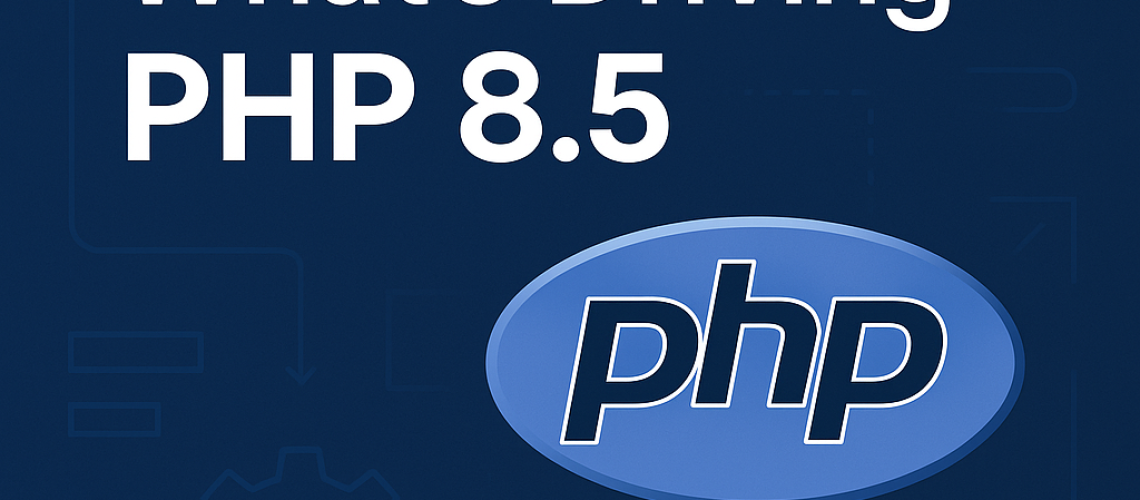PHP 8.5 doesn’t aim to revolutionize the language. Instead, it focuses on developer ergonomics, clarity, and solving minor pain points. Every major version of PHP brings changes, but some releases matter more for day-to-day productivity than for headline features. With PHP 8.5 (scheduled for release on November 20, 2025) we’re getting a number of those “finally” improvements — things many developers have wanted for a while. The features in this version are built around:
- Cleaner syntax and function-chaining
- More useful built-ins for array handling
- Better debugging and error visibility
- Stronger support for internationalization (i18n)
- Deprecating outdated features and tightening code consistency
Key New Features
Here are the most important additions and improvements in PHP 8.5, with real-world relevance.
1. Pipe Operator (|>)
- Allows chaining callables left-to-right, passing the result of the previous step into the next.
- Example:
$result = " Hello World " |> trim(...) |> strtoupper(...) |> strlen(...); - Helps reduce nesting and intermediate variables; improves readability.
- Some limitations: all callables in the chain must accept the piped value as their first argument; by-reference parameters may have restrictions.
2. Array Helpers: array_first() and array_last()
- Simpler, clearer way to retrieve first/last values of an array (not keys).
- For empty arrays, they return
null.
3. Error & Exception Handler Getters
- New functions:
get_error_handler()andget_exception_handler()allow you to retrieve the current handlers. Useful for frameworks, debugging, chaining or restoring handlers.
4. Fatal Error Stack Traces
- A new INI directive
fatal_error_backtraces(enabled by default) will include stack traces when fatal errors occur. This makes diagnosing issues much faster. - Sensitive parameter visibility considerations are respected (e.g.
#[\SensitiveParameter]).
5. Internationalization Enhancements (Intl, Locales, etc.)
- New class
IntlListFormatterfor locale-aware list formatting. - New functions/methods:
locale_is_right_to_left()andLocale::isRightToLeft()to detect text direction. - Improvements in number formatting, locale subtags normalization (like likely/minimize subtags) etc.
6. Other Utilities & CLI Improvements
- New constant
PHP_BUILD_DATEgiving the build date of the PHP binary. Helpful for deployments/debugging. - New cURL function:
curl_multi_get_handles()to obtain all handles attached to a multi-handle. - CLI mode:
php --ini=diffto show only INI directives that differ from defaults. Good for quickly seeing configuration drift. - New INI directive:
max_memory_limitto set a ceiling on memory_limit in certain contexts.
7. Support for Closures and First-Class Callables in Constant Expressions; Attributes on Constants
- You can now use static closures and first-class callables in constant expressions.
- Constants can have attributes attached directly (one constant per statement).
- Final property promotion: marking a constructor-promoted property as
final.
Deprecations & Changes to Note
These are things to watch out for when upgrading or writing forward-compatible code.
| Deprecated / Changing Item | What’s Changing / Why It Matters |
|---|---|
MHASH_* constants | All MHASH_ constants are deprecated. Use the newer hash() extension or modern cryptographic APIs. |
| Non-canonical scalar type casts | Certain non-canonical type casts (boolean |
| Returning non-string values from a user output handler | Deprecated. Output handlers are expected to return strings. |
| Emitting output from custom output buffer handlers | Also deprecated. |
These deprecations aren’t likely to break large parts of modern code, but older libraries or code that use legacy features may need adjustments.
Migration Considerations
If you plan to move an existing codebase to PHP 8.5, here are some practical tips:
- Dependency Audit: Ensure all your libraries, frameworks, and extensions support 8.5, especially third-party ones.
- Testing: Use the beta / release candidate versions in staging or development to catch deprecation warnings and potential breakage.
- Code Refactoring: Consider using the new helpers (
array_first,array_last), adopting the pipe operator where readable, etc. But avoid over-refactoring just for novelty. - Configuration Review: Check PHP and
inisettings: enable features likefatal_error_backtraceswhere useful; check memory settings, etc. - Backward Compatibility: Many changes are additive or optional; but deprecated features should be eliminated proactively.
Why Upgrade: Benefits vs Risks
Benefits
- Cleaner, more expressive syntax → easier to read/write, especially for chaining or transformation-style code.
- Better debugging: stack traces on fatal errors, introspection of handlers.
- Improved i18n / locale support → better suited for multilingual or RTL layouts.
- More built-ins → less boilerplate, less chance of subtle bugs.
Risks
- Some deprecations may cause warnings or errors with legacy code.
- New features may have edge-case behavior which libraries might not yet fully support.
- Upgrading too early without ecosystem support can lead to compatibility issues.
Conclusion
PHP 8.5 is not about flashy overhaul: it’s about refinement, stability, and giving developers tools that make their lives easier. If you’re maintaining a PHP codebase or developing new applications, 8.5 promises meaningful improvements in readability, debugging, internationalization, and clarity. As always, plan your upgrade carefully, test thoroughly, and take advantage of the new features where they make sense.
References & Official PHP Documentation
- PHP Watch: PHP 8.5: What’s New and Changed — a detailed rundown of features. PHP.Watch
- Sensiolabs: What’s New in PHP 8.5: A Comprehensive Overview. SensioLabs
- Official PHP Manual & RFCs (once released) — keep an eye on php.net
Ready to Upgrade to PHP latest version with Confidence?
From harnessing new features to avoiding breaking changes — AppsTechy can help you smoothly migrate, optimize, and future-proof your PHP applications.




